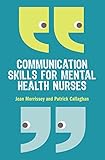Communication skills for mental health nurses / Jean Morrissey, Patrick Callaghan.
Material type: TextPublication details: Maidenhead : Open University Press, c2011Description: xiv, 183 p. : ill. ; 23 cmISBN: 9780335238705 (Pbk.)Subject(s): Psychiatric nursing | Psychiatric nurses | Communication in nursingLOC classification: RC440 | .M67 2011
TextPublication details: Maidenhead : Open University Press, c2011Description: xiv, 183 p. : ill. ; 23 cmISBN: 9780335238705 (Pbk.)Subject(s): Psychiatric nursing | Psychiatric nurses | Communication in nursingLOC classification: RC440 | .M67 2011 | Item type | Home library | Call number | Copy number | Status | Notes | Date due | Barcode |
|---|---|---|---|---|---|---|---|
|
|
MMSU Main Library | RC440.M67 2011 CHS (Browse shelf(Opens below)) | 14-0276 | Available | Circulation | 32536-CHS |
Includes bibliographic references and index.
1. Core communication skills in mental health nursing : Interpersonal skills ; Using skills in practice -- 2. Values, culture and evidence-based communication : Values-based communication ; Culture-based communication ; Evidence-based communication ; Skills for evidence-based practice ; Therapeutic communication: what works, for whom and under what conditions? ; Fostering recovery and wellbeing through therapeutic communication -- 3. Reflection and communication : Understanding reflection: what is it? ; The reflective process ; Models of reflection ; Fostering reflection and reflective practice ; The role of the reflective facilitator ; Organizational factors and reflection ; Learning to become a reflective practitioner -- 4. The therapeutic use of small talk: phatic communication : Phatic communication ; Using phatic communication in mental health nursing ; Brief, ordinary and effective (BOE) communication ; Therapeutic use of self ; The efficacy and effectiveness of small talk -- 5. Heron's communication framework: six category intervention analysis : The six category intervention analysis ; Applying six category intervention analysis ; Degenerate use of interventions ; Learning to use the six categories -- 6. Communicating across cultures : Understanding culture ; Culture and mental health ; Culture and mental health nursing ; Communicating across cultures ; Working with interpreters ; Learning to be culturally competent and capable --
7. Professional helping relationships : Patient-centred care: what is it? ; Understanding empathy ; Models of empathy ; Empathy or sympathy? ; The use of empathy in practice ; Learning the skill of empathy ; Congruence ; Unconditional positive regard ; Setting and maintaining boundaries ; Attributes of effective helpers -- 8. Communicating assertively : Understanding assertiveness ; The benefits of being assertive in practice ; Factors that affect nurses' level of assertiveness ; Using assertiveness skills in practice ; Assertive responses ; Learning to use assertiveness skills -- 9. Resolving conflict : The nature, sources, causes and consequences of conflict ; Types of conflict ; Sources of conflict ; Consequences of conflict ; Conflict resolution -- 10. Solution-focused interventions in mental health nursing : Solution-focused interventions ; The efficacy and effectiveness of solution-focused brief therapy ; The efficacy and effectiveness of cognitive behavioural approaches ; Using cognitive behavioural approaches in mental health nursing ; Problem-solving interventions (PSI) ; The efficacy and effectiveness of PSI -- 11. Motivational interviewing in mental health nursing practice : What is motivational interviewing? ; Self-motivational statements ; Applying the three phases of MI in mental health nursing ; Applying MI theory to communicating using MI ; Evidence-based MI

There are no comments on this title.